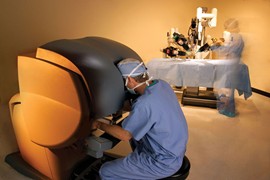Robotic Surgery
Trust the skilled surgeons at North Kansas City Hospital & Meritas Health to provide robotic surgery that meets your surgical needs. For more than a decade, we’ve been using robotic technology to make our minimally invasive surgeries more precise — resulting in faster, easier recovery for you.
What is Robotic Surgery?
Robotic surgery, or robot-assisted surgery, is one type of minimally invasive surgery. It enables surgeons do complex procedures from just a few small incisions.
With robotic surgery, the surgeon works from a control center (called a console) near the operating table. They use a special type of 3-D, high-definition camera. The camera helps them guide a mechanical arm with surgical instruments to complete the surgery.
You’ll find that many specialties use robotic surgery. Examples include colon and rectal care, gynecology, urology and general surgery.
Benefits of Robotic Surgery

Robotic surgery offers the same benefits as other minimally invasive surgeries. These benefits include less pain and faster recovery. Robotic surgery also:
- Gives your surgeon better accuracy and control during the procedure
- Improves both surgeon and patient comfort during surgery
- Makes it easier to do more complex, detailed procedures
Who is Eligible for Robotic Surgery?
Some surgeries are better suited for robotic surgery than others. Talk to your doctor about your options for surgery. You also can contact a robotics specialist at NKCH for more information.
Robotic Procedures
With our Da Vinci® Robotic Surgery System, your surgeon can reach areas of the body that used to require traditional surgery. Discover the many robotic procedures available at NKCH.
Urologic surgery and other procedures include:
- Adrenal gland tumor removal (adrenalectomy)
- Bladder removal and creation of a drain, also known as a stoma (cystectomy with ileal conduit)
- Clearing of obstruction between the kidney and the bladder (pyeloplasty)
- Kidney surgeries, such as:
- Kidney cyst removal (renal cyst decortication)
- Kidney and ureter removal (nephroureterectomy)
- Kidney removal, part or all (nephrectomy, partial or radical)
- Renal biopsy
- Prostate gland removal (prostatectomy)
- Renal pelvis reconstruction (pyeloplasty)
- Repositioning of the tube that carries urine from the kidney to the bladder (ureteral reimplantation)
- Surgery to block sperm in males (vasectomy)
Gynecologic surgery and other procedures include:
- Endometrial implant removal with uterus preservation
- Fallopian tube surgery (tuboplasty)
- Fibroid removal (myomectomy)
- Laparoscopy to diagnose and treat endometriosis and other pelvic conditions
- Noncancerous uterus fibroid tumor removal (myomectomy)
- Ovary removal (oophorectomy)
- Pelvic organ prolapse correction (sacral colpopexy)
- Uterus lining removal (endometrial resection/endometrial ablation)
- Uterus removal (hysterectomy)
General surgeries include:
- Appendix removal (appendectomy)
- Gallbladder removal (cholecystectomy)
- Gastroesophageal reflux disease (GERD) relief (Nissen fundoplication)
- Hernia repair (ventral, incisional, inguinal)
- Spleen removal (splenectomy)
Receive partial or full colon removal (colon resection or bowel resection).
Bariatric and gastroenterology procedures include:
- Esophageal surgery (Nissen fundoplication)
- Obesity treatments from the Total Weight Loss Center:
- Gastric bypass
- Modified duodenal switch
- Sleeve gastrectomy